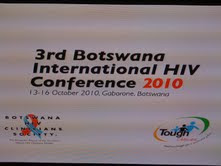After about six weeks in a new place, one might expect to have learned
some of the language, customs and social norms that dictate daily
life. Indeed, I am learning to walk on the left side of the path,
greet people with dumela mma/ raa, and I have even mastered the
customary handshake that involves three distinct hand grasps. One of my
colleagues has taken me under her wing and is teaching me phrases in Setswana;
but I have all but given up on really learning to communicate
effectively in the language.
I am, however, learning a completely different language.. the language
of Botswana-Harvard Partnership's (BHP) Standard Operating Procedures
(SOP's) and Standard Forms (SF's). I have spent the past few weeks
working on the SOP's for research participant clinic visits. Every
research study has a code (ours is BHP041). Because the research we
are doing is on such a large scale, everything has to be standardized
so that data keyers can easily enter information from the standardized
forms into computer databases. A few weeks ago, when I started this
process, I was confused by all of the codes. What does it mean that we
need to complete an HR210, HR201, HR 101 and HR401 during the
post-survey follow-up visit? Now I know that each of these are the
codes for the forms that go along with the DBS & Rapid HIV, HIV ELISA,
CD4 and VL tests respectively. (DBS = dried blood spot; VL = viral
load). What is CN001 and how is it different from a CN002? These are
different versions the consent form that are filled out during
different stages of participation.
This new language, along with some of the tools we are using to store
and share information have been keys to my success at BHP. One of the
most useful tools has been the wiki. All of the SOP's and SF's are on
BHP's wiki and many of the SOP's and SF's are undergoing revisions. (Making these revisions requires a separate set of computer language skills). As
we update SF's and SOP's it is important to ensure that everyone is
working with the most up-to-date versions. With investigators
collaborating from across thousands of miles, this gets to be
confusing-- but somehow it all seems to work out in the end.
So, while I may not be becoming a fluent Setswana-speaker , I am
learning a new language. In fact, when I was learning Spanish in
junior high and high school, my teacher told me that I would know I
have mastered the language (which I never did) when I started dreaming
in Spanish. Well, I haven't had any dreams in Setswana, but I did wake
up one morning wondering about an ST002-PNL (the partner notification
form that we give to participants to invite their partners to
participate in the study).
Go Siame (goodbye).

















































